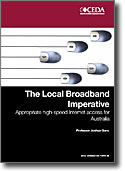Australia's governments should ensure that many different broadband systems can be brought to different parts of Australia. And the nation should avoid building a monolithic new national broadband Internet network.
 Download the information paper
Download the information paper
Report highlights
The Local Broadband Imperative finds that Australia will get the best possible broadband service by creating a system that delivers a wide variety of local solutions.
The report for CEDA by Professor Joshua Gans has been published at a time when debate over broadband is rising again. In November 2006, News Corporation CEO Rupert Murdoch called Australia's broadband service "a disgrace".
The Local Broadband Imperative finds that Australians have now adopted
broadband at about the OECD average rate. But by world standards, the report says, Australian broadband is extremely slow: we are the only OECD nation where more than half of all broadband users download data at 512 kilobits per second or less.
However, Australia should not try to fix this by imposing a single national system of faster broadband from a single provider such as Telstra, the report says - because broadband is not a settled, "one-size-fits-all" technology like electricity or the existing fixed-line phone system.
Instead, broadband is much better suited to a series of different local-level solutions - for instance, a very fast fibre-based local network in one place, competing cable and wireless networks in another, basic ADSL in a third.
The report says broadband is yet to have its greatest effect on the economy, and argues that in the long run its greatest effect is likely to be on person-to-person communications rather than in delivering one-way, television-style services.
CEDA's view
CEDA acting chief executive Greg Meek says: "This report suggests new ways to get the appropriate broadband without spending unnecessary billions on a new national broadband roll-out".
"Australia's broadband debate has been going around in circles," Mr Meek says. "The existing system leaves many people unsatisfied, and it's widely argued that we need to roll out a huge new network. Professor Gans argues that few of the existing telecommunications firms have the right incentives for big new broadband investments."
"This report is designed to point the debate in new directions."